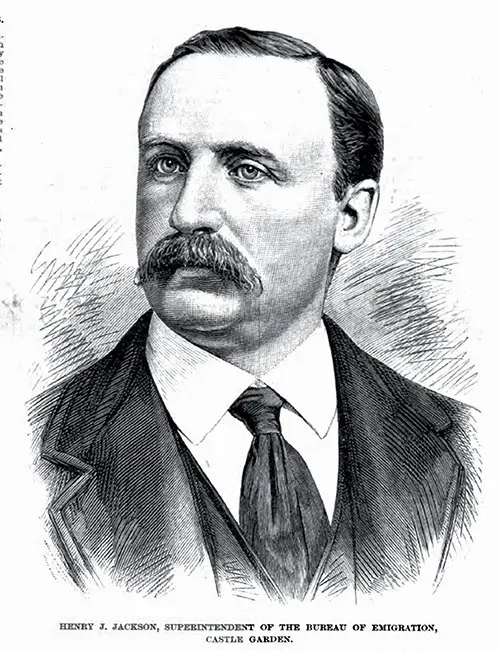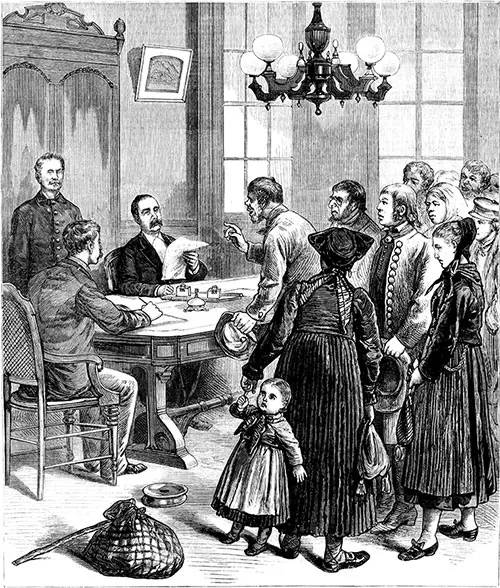Immigrants at Castle Garden - 1880
Introduction
The article "Immigrants at Castle Garden - 1880" provides a detailed account of the experiences and challenges faced by immigrants arriving at Castle Garden, New York City’s primary immigrant processing center during the late 19th century. It highlights the procedures that immigrants underwent upon arrival, the conditions they encountered, and the broader social and economic context of immigration during this period. The article also reflects on the impact of these immigrants on American society and the significance of Castle Garden as a gateway to the United States.

Henry J. Jackson, Superintendent of the Bureau of Emigration, Castle Garden. Frank Leslie's Illustrated Newspaper, 27 November 1880. | GGA Image ID # 14ffd48f80
I crossed Battery Park upon a glorious, sun-shiny morning of last week and passed through a dense crowd of comfortably clad, clean, healthy, and thrifty-looking immigrants, speaking all the tongues that ever wagged at Babel, penetrated the precincts of Castle Garden.
A very courteous official met me in the Rotunda, and, having Informed him that I desired to see Mr. Henry J. Jackson, the Superintendent of the Commissioners of Emigration for the State of New York, I was shown up an iron staircase and through a large desk-laden office into a bright, cheery, oblong apartment, known as the Board Room, where I encountered the official of whom I was in quest—a bright-eyed, florid-faced, merry-looking gentleman, halfway in the thirties.
"Here's more of it!" laughed Mr. Jackson, handing me an open letter. "Just read that, for in addition to all my other duties, it would appear that I am a matrimonial agent," The letter ran:
" November 12th.
" Mr. Jackson—I take the liberty to write to you to ask you to do me a kindness by giving me the address of some Western gentleman. I want to send my address to someone of good moral character—a dark-complexioned man preferred. Sending my address to such a man would add to the happiness of my life, and please oblige a lonely girl who wishes to secure a husband.
" Address: Miss Rosalind Sweetman.
" Henby, Pa."
'You wouldn't believe it,' Mr. Jackson said, 'ever since a letter from a German immigrant seeking a wife was published in the Herald, my mailbox has been flooded. Look at this!' he exclaimed, tossing a bundle of letters onto the table. 'And this is just a fraction of what I receive.'
After glancing over the contents of some of those letters, which were as quaint as they were straightforward and amusing, Mr. Jackson resumed :
"This year has proved to be the most significant emigration year for a quarter of a century, and the class of immigrants is exceptionally good especially the German element. Indeed, I can say the same for the Irish.
Mr. Davitt, the Irish agitator to whom I spoke the other day, laughingly remarked about the clean and comfortable appearance of the Irish emigrants now arriving: ' Maybe it's because they have forgotten to pay the rent.'
We have had as many as 8,000 emigrants to house in that Rotunda this season, while all our licensed boarding houses were crammed to the uttermost limits of their capacity. This is our Board Room. The Board of Emigration Commissioners meets here and holds investigations."
"What Is the nature of these investigations ?" I asked.
"Principally inquiries into the want of civility of subordinate officers on board the steamers and the quantity and quality of the food furnished."
The walls of the Board Room are adorned with rare old prints of Castle Garden and the Battery. One of these dates from the visit of Jenny Lind, and the name of the gifted cantatrice appears in large letters over the entrance to the Garden.
A very line portrait of Governor Cornell occupies one wall. At the same time, photos of some of the ragged, homeless girls taken from the street scrapings of Liverpool by Father Nugent and brought out to Minnesota last year teach a wondrous lesson. In little less than twelve months, these girls, from being hatless and shoeless, are now gorgeously arrayed in those fardels so dear to the feminine heart and earning from $10 to $12 per month.
"The routine of Castle Garden may be briefly summarized," observed Mr. Jackson. " After examination of their luggage on shipboard by the Customs officers, the immigrants are transferred to this landing depot, where they are received by the officers of the Commission, who enter in registers kept for all necessary particulars for their future identification.
The names of those who have money, letters, or friends awaiting them are tallied out, and they are put into immediate possession of the property or committed to their friends, whose credentials have first been properly scrutinized. Those who desire can find clerks at hand to write letters for them in any European language and a telegraph operator within the depot to forward dispatches.
Here, the main trunk lines of the railway also have offices. While the immigrant can buy tickets and have his baggage weighed and checked, brokers are admitted (under restrictions that make fraud impossible) to exchange the foreign coin or paper of immigrants.
A restaurant supplies them with plain food at moderate prices; a physician is in attendance for the sick. A temporary hospital is ready to receive them until they can be conveyed to Ward's Island, where we have our chief hospital and its efficient and numerous staff.
Those In search of employment are furnished at the labor bureau connected with the establishment, such as those who desire to start at once for their destination are sent to the railway or steamboat. At the same time, any who may choose to remain in the city are referred to boarding-house keepers admitted to the depot, whose charges are regulated under special license, and whose houses are kept under constant and rigid supervision by the Commission."
"Are these services rendered gratuitously, Mr. Jackson?"
"Yes, sir. Without any fee or charge whatever to the immigrant."

New York City -- The Great Work of the State Commissioners of Emigration -- Superintendent Jackson Listening to the Complaints of Emigrants in His Office at Castle Garden. Frank Leslie's Illustrated Newspaper, 27 November 1880. | GGA Image ID # 14ff92ba22
At this moment, some newly arrived Suabian and Irish Immigrants demanded a hearing, bringing a series of alleged grievances to the Board.
In a twinkling, they were admitted, and as I quitted the Board Room, the Irishman was engaged in stating his case with all the rhetoric for which his nation is so justly famous.
"Immigrants at Castle Garden," in Frank Leslie's Illustrated Newspaper, 27 November 1880, pp. 197, 201.
Immigrants at Castle Garden - 1880
A Window into America’s Immigration Gateway
The "Immigrants at Castle Garden - 1880" article offers a vivid and detailed account of the experiences of immigrants arriving at Castle Garden, the premier immigration processing center of its time. This historical narrative provides insights into the challenges, processes, and human stories of immigrants stepping into their new lives in America, making it an essential resource for teachers, students, genealogists, family historians, and history enthusiasts.
Why This Page is Essential for Understanding Immigration History
- A Rich Historical Record for Educators and Students
- The article paints a detailed picture of immigrant life and procedures, ideal for classroom exploration of 19th-century immigration.
- Illustrates key themes such as adaptation, cultural integration, and the role of Castle Garden as a gateway to the American Dream.
- Invaluable for Genealogists and Family Historians
- Provides context for ancestors who may have passed through Castle Garden.
- Highlights the critical role of Superintendent Henry J. Jackson and the efforts to assist immigrants in their transition.
- A Unique Perspective for History Enthusiasts
- Delivers a ground-level view of daily operations and immigrant stories, from labor exchanges to hospital services.
- Features firsthand accounts of grievances and resolutions, showcasing the human side of immigration history.
Highlights of the Article
- The Arrival Process:
Immigrants were greeted by officers who recorded their information, reunited them with family, and facilitated their onward journeys through railways, boarding houses, or labor bureaus. - Services Provided:
Castle Garden offered a comprehensive range of free services, including currency exchange, telegraph communication, food, and medical care. A labor bureau connected immigrants with employers. - Diverse Immigrant Experiences:
The article describes a bustling, multicultural scene, with immigrants from Germany, Ireland, and other nations arriving in hope and determination. - Human Stories:
Superintendent Jackson’s anecdotes, including humorous accounts of immigrants seeking spouses, provide a relatable and personal glimpse into this historical setting. - Efforts to Protect Immigrants:
Castle Garden worked to prevent exploitation, with strict oversight of boarding houses and brokers, ensuring fair treatment and smooth transitions for newcomers.
Call to Action
This article invites readers to explore the rich history of Castle Garden as a gateway to America. By reviewing this page, you will uncover the intricate processes, heartfelt stories, and significant contributions of immigrants who shaped the nation. Whether you're a teacher, student, or family historian, this page offers a wealth of knowledge to enrich your understanding of the immigrant experience. Discover the profound legacy of Castle Garden today!
